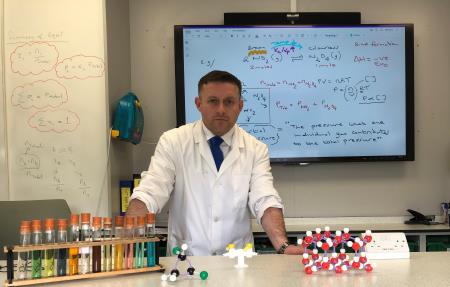Related articles
Sparking an A* in Chemistry
After many years teaching at one of the UK’s leading independent schools, St Paul’s School, Mr Simon Clarke is no stranger to stretching and challenging his students to reach their full potential. This year saw 100% of students at Kensington Park School achieve A*- A grades in A-level Chemistry, an outstanding achievement. We asked Mr Clarke to share his thoughts on the key ‘elements’ to success.
Q: In your opinion, what are the factors behind a student achieving an A or A* grade in Chemistry?
Mr Clarke: A good A-Level student requires both qualitative and quantitative analytical skills. As well as lots of number-crunching, students will also be required to articulate concepts.
Chemistry is often portrayed as a difficult subject, however, like any science it is governed by a universal set of principles that underpin the core aspects of the subject. Students can expect that, in my class, they will have the opportunity to develop a solid understanding of these principles and methods before building their knowledge of wider topics.
Q: What role does the teacher play in helping students achieve top grades?
Mr Clarke: I like to stretch all of my students to their true potential. Chemistry is not an endless stream of facts as some students fear; one of the most satisfying moments as a teacher is to watch the penny drop in a student’s mind, when they realise that the same trends and patterns can explain multiple phenomena.
I like to challenge my students with thought-provoking discussions throughout the lesson (there’s no hiding place in my chemistry class!)
For the keenest students, I provide extra classes to allow entry into the Cambridge Chemistry Challenge and the RSC Olympiad competition. I once coached two students in the same year group that went on to represent Great Britain in the Chemistry Olympiad finals.
I also see believe that it is our role as teachers to ask relevant questions that enable students to think for themselves, as often as possible.
Q: What advice do you have for students aiming to achieve an A* grade?
Mr Clarke: Start early and don’t shy away from asking questions. Chemistry is a very cumulative subject and the earlier that a student begins to consolidate key equations, definitions, trends, and patterns, the better. Like most things, practice makes perfect!
At Kensington Park School, we provide a comprehensive set of summary notes at the end of each topic of the course which can further help students to revise and consolidate. Students have access to all past papers via our online learning platform.
Q: How do you make Chemistry exciting?
Mr Clarke: Chemistry is a practical and visual subject so there is nothing better than bringing the different topics to life through demonstrations and practical work as often as we can. Students can expect to be exposed to large amounts of practical work throughout the course which is a good stepping stone for those moving on to scientific courses at university.
Chemistry underpins so many aspects of the scientific world around us and it is rewarding to incorporate as much of that as possible into our day to day teaching. For example, every single topic in our physical chemistry course could be applied to the launching of a rocket into space; from the energetics of the fuel combustion, to the kinetics of the reactions that take place, and the thermodynamics driving forces behind them.
I pride myself in making detailed notes for all students. These notes tell the story of the topic and develop the ideas from first principles. Over the years, students have commented on how much they appreciate the comprehensive notes they gain from attending the lessons, and how useful these become in easily shaping the revision process at the end of the course.
Students can also expect to be challenged to discuss concepts and engage in quantitative-based problem solving throughout the lesson.






